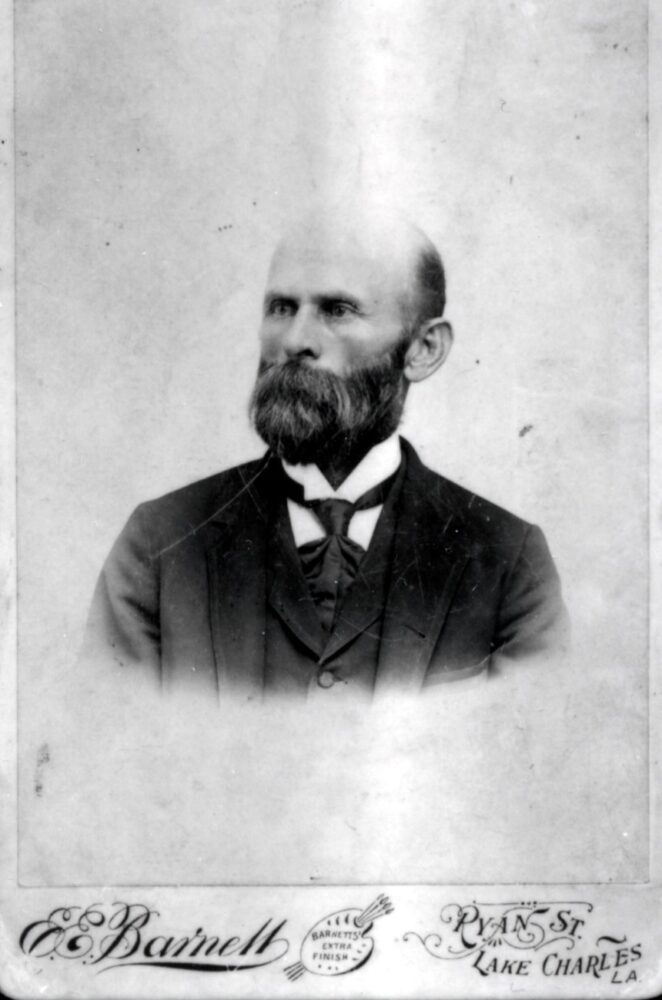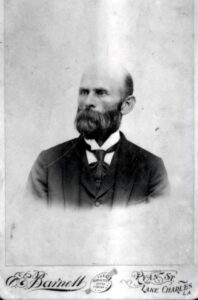John McNeese
The namesake of McNeese State University, John McNeese was a late-nineteenth-century champion of public education who led the creation of numerous schools in southwest Louisiana.

McNeese State University, Frazar Memorial Library
John McNeese became a member of the Imperial Calcasieu School Board in 1883 and went on to serve six terms as parish superintendent of schools. Photo by E. E. Barnett.
John McNeese, the namesake of McNeese State University and whom many call the father of education in Louisiana, was a pioneering educator in southwestern Louisiana.
Early Life and Ventures Before Education
Born on July 4, 1843, in New York City, McNeese lost his parents at an early age. His siblings returned to Scotland, the birthplace of both his parents. He moved to Baltimore, becoming the ward of Dr. Nathaniel Stafford. By all accounts, despite the tragedy that marked his early life, McNeese experienced a happy childhood, receiving a good education and displaying a sense of civic mindedness. He entered the Union Army in 1861.
Though McNeese would eventually become known as “Professor” and the “Father of Public Education” in Louisiana, he did not begin his career in education. After receiving an honorable discharge from the Union Army, McNeese struck out for Texas, opening a mercantile and cattle business in a small town about one hundred miles west of Austin. For a time he prospered. In 1872 he was elected district clerk of court. Less than a year later, suffering under the Panic of 1873, his mercantile business closed. To salvage a profit from what was left of their cattle business, a group of ranchers decided to drive their remaining stock to the beef market in New Orleans.
Disaster struck McNeese again. Tormented by drought and exhaustion, McNeese’s herd gorged itself on switch cane growing along the Sabine River. Nearly the entire herd died of intestinal bloat. After swimming his remaining cattle across the river, McNeese sold off the few head he had left, took lodging with the Bilbos of Hickory Flat, near Oberlin, Louisiana, and turned his attention to making a living through an itinerant singing and writing school he founded. He also began courting the daughter of William and Hulda Cole Bilbo.
Turn to Education
McNeese married Susan Bilbo in 1876. A short time later the couple moved to Lake Charles, where McNeese continued his work as a schoolteacher for a time. In 1886 he enrolled in Tulane Law School in New Orleans, paying his tuition by selling off land received in his wife’s dowry. He earned his Bachelor of Laws in 1887.
McNeese fared better as a lawyer than during his cattle-driving days, but not by much. He soon returned to teaching in Calcasieu Parish. In 1883 he was appointed a member of the Parish Board of School Directors. In 1888 the school board elected him superintendent of public education for the parish.
Calcasieu Parish Superintendent of Public Education
From 1888 to 1913 McNeese served six terms as Calcasieu Parish superintendent of public education. During that time he transformed public education in the region, expanding access to schooling and ensuring that education was robust, self-sustaining, and high quality.
At the time McNeese was first elected superintendent, “Imperial Calcasieu” Parish included the current parishes of Allen, Beauregard, and Jefferson Davis. This area encompassed more than twenty-five hundred square miles with roughly twenty thousand residents. There were few schools in the region, none in Lake Charles, none opened for more than a few months at a time, and none with a sustained funding structure.
In his first term McNeese increased the number of schools in the parish from four or five to twenty-four. He negotiated a parish loan to build a school building in Lake Charles, established a teacher institute to train educators, and began to lobby for local municipalities to levy taxes to raise funds. The funds would go to professionalizing teachers and removing the continual burden of schools and the superintendent seeking funding from local police juries. By the close of his first term, full-time schools in the parish numbered more than one hundred and enrollment grew from 840 to almost five thousand, indicating the zeal for education spreading in the area due to McNeese’s influence.
During his subsequent terms as superintendent, McNeese sought to consolidate smaller schools into larger ones with improved facilities and better-trained teachers. He established a central high school and a normal institute, which trained teachers in pedagogy and curriculum standards. He pioneered classroom supervision to improve instruction and continually pushed for higher wages to attract the best and most committed teachers. He instituted teacher exams and instilled a mindset of continual improvement. Through his leadership it also became practice for all principals to be graduates of the normal school.
During McNeese’s tenure, having funds on hand to pay teachers and perform upkeep and maintenance of the schools became a central concern. At the time parish school boards relied on police juries and town councils for appropriated funds. There were years when schools struggled to open or closed suddenly due to resources being unavailable. In McNeese’s second term as superintendent, for example, the Lake Charles schools opened only because the school board struck a last-minute deal with the police jury and a local bank representative, who agreed to loan the board the money it needed to open schools. It was through McNeese’s sustained efforts that legislative acts were passed that enabled citizens of parishes and cities to vote to levy taxes to fund schools and construct school buildings. This new revenue stream greatly increased schools’ ability to prepare for the future, keep a trained staff employed, and ensure curricula could be planned and followed.
Legacy
McNeese died on June 2, 1914. He was a pioneer in many phases of public education and changed the course of education in Calcasieu Parish, southwestern Louisiana, and the entire state. McNeese’s lasting influence is most obvious in McNeese State University, which not only bears his name but likely owes its start to his leadership and forethought. The establishment of a college in Lake Charles to train teachers and offer adult education was a dream of his since his second term as superintendent. However, the college did not open its doors until 1939 as Lake Charles Junior College but was soon changed to John McNeese Junior College to honor McNeese’s accomplishments. In 1950 the college became a four-year institution. In 1970 it officially changed its name to McNeese State University. A statue of McNeese stands proudly on its grounds.
